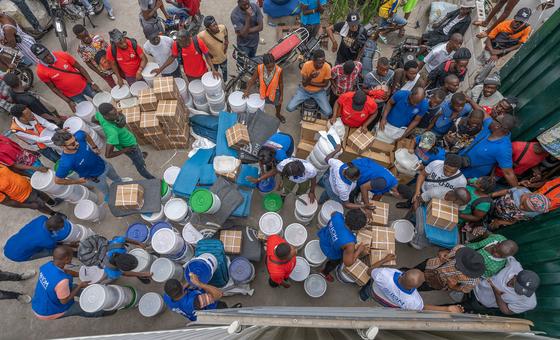
Latest data from the International Organization for Migration indicates that more than one million people have been displaced across Haiti so far, up from the 315,000 recorded on 20 December 2023.
“The most concrete data we have is that around 1,041,000 people are currently living in displacement in Haiti. Most of these people have been displaced multiple times,” said IOM spokesperson Kennedy Okoth Omondi.
The majority of those forced to flee their homes left the capital Port-au-Prince, where heavily armed gang violence is “relentless” while essential services have collapsed – “particularly healthcare and worsening food insecurity”, Mr. Omondi continued.
Neighbouring provinces have also been impacted by gang violence and an influx of Haitians fleeing spiralling insecurity. “Many are seeking refuge in Haiti’s provinces, overwhelming host communities and straining limited resources,” the IOM spokesperson said. “In the Artibonite department, displacement tripled in 2024, reaching over 84,000 people, highlighting the spread of violence beyond the Haitian capital.”
Thousands killed in 2024
Last week the UN human rights office, OHCHR, reported that shocking gang violence left more than 5,600 people dead last year.
In recent weeks, gangs have been held responsible for killing hundreds of people in separate massacres over the course of several days.
In the first incident, OHCHR said that some victims were dismembered, after being accused of using alleged voodoo practices to cause the death of the leader of the Wharf Jérémie gang in the capital’s Cité Soleil, before their body parts were tossed into the sea.
The UN rights office also documented 315 lynchings of gang members and people allegedly associated with gangs, which on some occasions were reportedly facilitated by Haitian police officers.
On 24 December, armed men reportedly opened fire on journalists at a press conference being held to announce the reopening of the Caribbean island nation’s largest public hospital, killing three.
Forcibly returned to Haiti
IOM noted that the deportation of some 200,000 Haitians principally from the Dominican Republic has placed an even greater strain on the country’s overwhelmed social services. “Communities are already struggling to basically survive,” Mr. Omondi said.
As the violence continues, the UN agency explained that it has become more difficult to safely reach the most vulnerable people in a growing number of displacement sites.
These are mainly concentrated in the capital and have mushroomed from 73 to 108 within a year, IOM said, highlighting severe overcrowding and a lack of adequate access to food, clean water, sanitation and education.
“Reports from these sites reveal deteriorating conditions, with families struggling to survive in makeshift shelters while facing mounting health and protection risks,” Mr. Omondi said.
Lack of funds
The UN’s $674 million humanitarian response plan for Haiti is only 42 per cent funded, leaving a gap of $388 million.
On 23 December, the Security Council stressed the need for the international community to double its efforts to support Haiti’s national police force – and strengthen a 2,500-strong Security Council-backed Multinational Security Support Mission led by Kenya.
To date, around 750 personnel have been deployed by Belize, El Salvador, Guatemala, Jamaica and Kenya, which has also indicated that it intends to deploy an additional 600 police officers.
